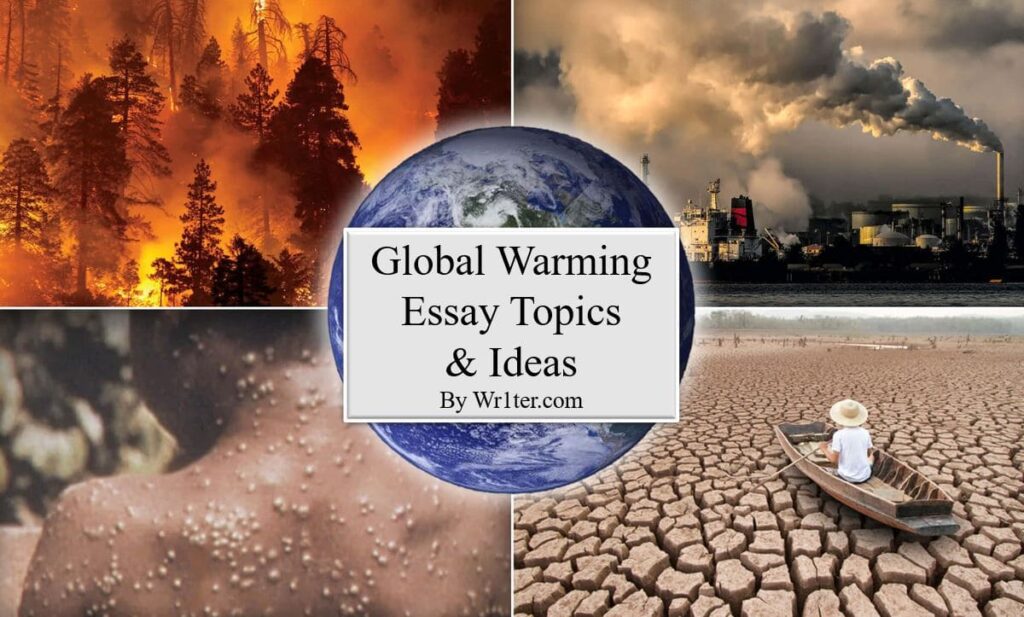Global warming essay topics are urgent and complex, with numerous aspects to study and explore. These themes may include an entire examination of its causes, such as carbon dioxide emissions, deforestation, and increased industrialization. One might also delve into profound effects that global warming has on the planet today, including rising sea levels, extreme weather events, and threats to biodiversity. People also may consider some roles and responsibilities of governments, businesses, and individuals in combating this crisis, focusing on renewable energy, sustainable practices, and conservation efforts. Alternatively, a particular analysis of various climate models and their predictions for a future may be a compelling focus. In turn, an exploration into social and economic impacts of global warming or a discussion on climate justice can provide unique perspectives on this pressing issue. Each angle of these global warming topics presents an opportunity to learn and enlighten about a matter that affects all life on Earth.
What Is a Global Warming Essay Topic and Its Purpose
According to its definition, a global warming essay topic is a specific subject that focuses on a critical issue of climate change, exploring key causes, effects, and possible solutions to this environmental crisis. For example, the main purpose for selecting a global warming essay topic is to raise awareness about environmental impacts of human activities, encourage informed discussions, and promote sustainable practices that can mitigate these effects (Johansen, 2024). Basically, common ideas address a rise in Earth’s temperatures due to greenhouse gas emissions, deforestation, and human industrial activities. Further on, global warming essay themes serve to educate readers on scientific evidence supporting global warming, consequences on ecosystems and weather patterns, and an actual need for urgent global action (Glavovic et al., 2021). In principle, these topics aim to stimulate critical thinking and motivate individuals, policymakers, and organizations to prioritize environmental responsibility, paving a way for future innovations that may combat detrimental effects of global warming. Moreover, diverse subjects promote critical analysis and encourage readers to consider scientific, political, and ethical dimensions of a given issue (Perga et al., 2023). Hence, global warming essay topics contribute to a broader dialogue on sustainability and an urgency of addressing climate change to protect future generations and preserve ecological balance.

How to Choose
Choosing a good global warming essay topic requires a careful consideration and examination of crucial factors to ensure a subject is relevant, engaging, and conducive to thorough analysis. For example, common ideas should align with current scientific discussions, focusing on specific aspects of global warming, such as its causes, impacts, or mitigation strategies (Anderson, 2021). In principle, selecting a relevant theme that is timely and supported by recent research enhances an overall credibility and depth of a paper. Further on, global warming essay subjects should allow for a comprehensive exploration while maintaining a clear focus (Santos & Bakhshoodeh, 2021). As such, instead of broadly discussing climate change, one might explore potential effects of global warming on polar ecosystems or roles of renewable energy in reducing greenhouse gas emissions. Moreover, students should consider a target audience and a purpose of a paper, ensuring a central theme is relevant to reader’s interests or educational objectives (Gates, 2022). Basically, they should encourage critical thinking and present an opportunity for original insight or argumentation. In turn, some steps for picking a good global warming essay topic include:
- Research Current Trends: Explore recent scientific studies and news on global warming to identify relevant, up-to-date ideas.
- Narrow a Focus: Choose a specific aspect of global warming, such as its effects on biodiversity or renewable energy solutions, to avoid an overly broad topic.
- Assess Available Resources: Ensure there is sufficient research material, including credible data and expert opinions, to support your chosen subject.
- Consider an Audience: Select a theme that resonates with your audience’s interests and knowledge level, making it more engaging and impactful.
- Encourage Critical Thinking: Pick a relevant global warming essay topic that invites analysis, debate, or problem-solving, allowing for a deeper exploration of climate change issues.
Hot Global Warming Essay Topics
- Understanding Global Warming: Facts and Fallacies
- Climate Change Policies: Approaches Across Different Nations
- Tackling Carbon Footprint: A Challenge for Big Corporations
- Greenhouse Gases: Sources and Solutions
- Deconstructing the Global Warming Debate: Science vs. Politics
- Global Warming and Sustainable Agriculture: A Comprehensive Study
- In-depth Examination of Renewable Energy Potential in Combating Global Warming
- Ocean Acidification: An Overlooked Consequence of Global Warming
- The Resilience of Wildlife Amidst Changing Climates: A Closer Look
- Exploring Alternatives to Fossil Fuels: Is Hydrogen the Answer?
- Global Warming and Public Health: Unseen Dangers and Solutions
- Climate Refugees: An Emerging Global Crisis
- Global Warming and Extinction: A Biodiversity Analysis
- Education for Climate Change: Incorporating Sustainability in Curricula
- Rethinking Urban Planning: Adapting Cities to Climate Change
- Impacts of Ocean Acidification on Marine Ecosystems
- Effects of Deforestation on Global Temperature Rise
- Influence of Extreme Weather Events on Agriculture
- Challenges of Mitigating Greenhouse Gas Emissions
- Economic Ramifications of Melting Polar Ice
- Roles of Renewable Energy in Slowing Climate Change
- Contribution of Industrialization to Atmospheric Carbon Levels
- Effects of Rising Sea Levels on Coastal Infrastructure
- Global Warming and Tourism: Adapting for a Sustainable Future
- Melting Polar Ice Caps: Exploring the Irreversible Consequences
- Agricultural Practices: Contributions and Changes in the Wake of Global Warming
- Examining Deforestation: A Major Contributor to Global Warming
- Climate Change Denial: Psychological Perspectives and Strategies for Engagement
Simple Global Warming Essay Topics
- Understanding the Basics of Global Warming
- Global Warming: What Does It Mean?
- Easy Ways to Reduce Your Carbon Footprint
- The Surprising Sources of Greenhouse Gases
- Politics and Global Warming: A Simple Overview
- What Is Sustainable Agriculture?
- Renewable Energy: An Introduction
- Ocean Acidification: Causes and Concerns
- Wildlife and Changing Climates: What Is Happening?
- Alternatives to Fossil Fuels: Are They Effective?
- Public Health Concerns Due to Global Warming
- Who Are Climate Refugees?
- Biodiversity Threat: The Connection with Global Warming
- Human Activities Driving Biodiversity Loss
- Global Policy Responses to Climate Crises
- Urban Heat Islands and Their Contribution to Climate Change
- Ethical Considerations in Geoengineering to Combat Warming
- Impacts of Changing Rainfall Patterns on Water Scarcity
- Health Threats Linked to Increasing Global Temperatures
- Technological Innovations for Reducing Carbon Footprints
- Roles of Public Awareness Campaigns in Climate Action
- Learning About Climate Change: Educational Perspectives
- Urban Planning: How Can It Adapt to Climate Change?
- Tourism in the Era of Global Warming
- Why Are Polar Ice Caps Melting?
- Farming in a Warmer World: What Is Changing?
- Deforestation: How Does It Contribute to Global Warming?
- Understanding Climate Change Denial: A Simple Analysis
Interesting Global Warming Essay Topics
- Decoding the Greenhouse Effect: Unraveling Its Connection to Global Warming
- Global Warming: A Symptom of Our Consumption Patterns?
- Behind the Curtains of Climate Policy: A Comparative Analysis
- Is Carbon Sequestration a Viable Solution for Global Warming?
- Adaptation vs. Mitigation: Strategies for Handling Global Warming
- Invisible Victims of Climate Change: The Plight of Coral Reefs
- Turning Tides: Predicting the Future of Coastal Cities Under Rising Sea Levels
- Desertification and Global Warming: An Unexpected Connection
- Can Space-Based Solar Power Help Mitigate Global Warming?
- Exploring Carbon Taxes: An Economic Approach to Global Warming
- World Heritage Sites Under Threat from Global Warming
- Eco-friendly Fashion: Addressing Climate Change Through Sustainable Design
- Food Security in a Warming World: A Detailed Analysis
- Navigating Geoengineering: A Potential Counter to Global Warming?
- Displacement of Communities due to Environmental Degradation
- Energy Consumption Patterns and Their Environmental Impact
- Human Health Risks Associated With Global Warming
- Roles of Technology in Addressing Climate Change
- Influence of Global Warming on Freshwater Resources
- Global Warming’s Impacts on Wildlife Migration Patterns
- Our Thawing Planet: Permafrost Melt and Its Consequences
- How Does Global Warming Affect the World’s Water Supply?
- Heat Waves and Global Warming: An Emerging Health Crisis
- Advancements in Electric Cars: A Response to Global Warming
- Global Warming: Will It Spark the Next Mass Extinction?
Academic Level Difference
Academic level differences in global warming essay topics reflect varying degrees of complexity, depth, and analytical expectations based on a particular level of education. At a high school level, common ideas may focus on introductory aspects of global warming, such as basic causes and effects, designed to build a foundational understanding (Johansen, 2024). In principle, diverse themes emphasize clear explanations of concepts, like greenhouse effect, deforestation, or impacts of pollution on climate change. At an undergraduate level, global warming essay topics require more in-depth analysis, incorporating scientific studies, statistical data, and discussions of specific solutions, such as roles of renewable energy or international climate agreements (Gates, 2022). Basically, these subjects demand critical thinking and an ability to evaluate multiple perspectives on a given issue. At a graduate level, global warming essay topics become even more specialized, focusing on advanced scientific research, policy analysis, or innovative approaches to mitigating climate change (Anderson, 2021). In turn, graduate-level students are expected to incorporate interdisciplinary approaches, original research, and detailed critique of current methodologies. Therefore, each academic level shapes an entire scope and focus of global warming essay topics, reflecting an increasing demand for rigor and expertise in addressing complex environmental issues.
Global Warming Research Topics
- Deciphering the Complex Interplay of Climate Change and Geochemical Cycles
- Assessment of Climate Change Mitigation Strategies: A Quantitative Approach
- Holocene Climate Variability: Learning From the Past to Predict the Future
- Efficacy of Carbon Capture and Storage Techniques in Mitigating Global Warming
- Exploring Climate Modelling: Advancements and Limitations
- Global Warming’s Influence on Atmospheric Circulation Patterns: A Meteorological Study
- Probing the Relationship Between Global Warming and Ocean Circulation
- Quantifying Climate Change Feedback Mechanisms
- Climate Engineering: Ethical and Socio-Political Considerations
- Assessing the Carbon Sequestration Potential of Global Forests
- Ecological Footprint Analysis in the Context of Global Warming
- Climate Change Projections: A Deep-Dive Into Uncertainty Analysis
- A Novel Examination of Cryosphere Dynamics in the Anthropocene
- Analysis of Climate Resilience in Urban Infrastructure Planning
- Climate Change and Vector-Borne Diseases: Modelling Future Scenarios
- Global Warming and Phytoplankton Blooms: A Marine Ecosystem Perspective
- Analyzing the Effect of Global Warming on Tropical Cyclone Intensity
- An Investigation Into Global Warming’s Influence on El Niño Southern Oscillation
- Assessment of Climate Change Vulnerability in Global Supply Chains
- Carbon Budgets and Global Warming: A Critical Examination of Existing Models
Argumentative Global Warming Topics
- Climate Change Attribution: How Certain Can We Be?
- Nuclear Power: A Necessary Evil in the Fight Against Global Warming?
- Decarbonization vs. Geoengineering: Which Path Forward?
- Carbon Trading Mechanisms: Effective Tool or Exploitative Measure?
- Assessing the Viability of 100% Renewable Energy Systems
- Are Carbon Offsets a Genuine Solution or Merely a Distraction?
- Climate Change and Migration: Should Climate Refugees be Legally Recognized?
- Assessing the Fairness of Climate Reparations and Their Potential Effectiveness
- Global Warming and Capitalism: Inherent Adversaries or Potential Partners?
- Sustainable Development Goals: Compatible with Climate Mitigation?
- Population Control as a Response to Climate Change: Ethical Considerations
- Climate Change Litigation: An Effective Tool for Climate Justice?
- The Paris Agreement: A Panacea or Merely a Step in the Right Direction?
- Moral Responsibility of Developed Nations in Mitigating Climate Change
- Climate Change Denial: Freedom of Speech or Dangerous Misinformation?
- Geoengineering Solutions to Global Warming: Salvation or Folly?
- Is Divestment from Fossil Fuels a Practical Strategy for Climate Change Mitigation?
- Evaluating the Concept of Climate Debt: Is it Justifiable?
- Global Warming and the Extinction Rebellion: A Valid Form of Protest?
Persuasive Global Warming Ideas
- Incorporating Climate Science Into K-12 Education: A Necessary Step Forward
- Transition to Renewable Energy: A Socioeconomic Perspective
- Why We Should Prioritize Adaptation Strategies in Low-Income Countries
- Regenerative Agriculture as a Mitigation Strategy for Climate Change
- The Moral Obligation to Take Action on Climate Change: An Ethical Perspective
- Building Resilient Communities in the Face of Global Warming
- The Urgency for Stricter Global Policies on Deforestation
- Rethinking Consumerism: The Potential for a Circular Economy
- Individual Actions in the Climate Crisis: Small Changes, Big Impact
- Global Warming and Water Scarcity: Why Conservation Matters
- Why a Carbon Tax Could Be a Game Changer in the Fight Against Climate Change
- Global Warming and Mental Health: An Underrated Issue
- Making a Case for Climate Change Education in Universities
- The Potential of Microgrids in Mitigating Climate Change
- Global Warming: Why We Should Care About Shrinking Glaciers
- Highlighting the Critical Need for Marine Conservation Policies
- Emphasizing Global Warming’s Threat to Food Security
- Convincing Argument for Urban Green Spaces in Mitigating Climate Change
- Why Energy Efficiency Should be a Priority in Modern Architecture
- The Need for Greater Investment in Climate Change Research
Cause and Effect Global Warming Ideas
- Interlink Between Deforestation and Rising Global Temperatures
- Greenhouse Gas Emissions and Their Correlation with Global Climate Anomalies
- Analysis of Drought Frequency and Severity in a Warming Climate
- Effects of Global Warming on Ocean Acidification and Its Ecosystem Impacts
- Global Warming and Its Influence on Polar Vortex Patterns
- Examination of Climate Change and Rising Sea Levels: Causes and Consequences
- Impact of Warming Temperatures on Biodiversity and Species Extinction Rates
- The Domino Effect of Melting Glaciers on Global Sea Levels
- Understanding the Causes and Effects of Increasing Wildfire Incidence
- Investigating the Link Between Global Warming and Vector-Borne Diseases
- How Does Global Warming Trigger Altered Weather Patterns and Extreme Weather Events?
- Analysis of Global Warming’s Influence on Coral Bleaching and Marine Ecosystem Disruption
- Investigation Into Climate Change and Its Effects on Agriculture and Food Security
- The Cause-Effect Relationship Between Carbon Dioxide Emissions and Global Warming
- A Detailed Study on the Effects of Global Warming on Human Health
- How Is Global Warming Accelerating the Thawing of Permafrost and Its Consequences?
- Causes and Effects of Global Warming on Polar Wildlife
- Exploring the Relationship Between Global Warming and Tropical Cyclone Intensity
- Global Warming and Its Role in Expanding Desert Regions
- Understanding the Link Between Global Warming and the Intensity of Heat Waves
References
Anderson, T. L. (2021). Adapt and be adept: Market responses to climate change. Hoover Institution Press, Stanford University.
Gates, B. (2022). How to avoid a climate disaster: The solutions we have and the breakthroughs we need. Penguin Books Ltd.
Glavovic, B. C., Smith, T. F., & White, I. (2021). The tragedy of climate change science. Climate and Development, 14(9), 829–833. https://doi.org/10.1080/17565529.2021.2008855
Johansen, B. E. (2024). Global warming and the climate crisis: Science, spirit, and solutions. Springer Nature.
Perga, M.-E., Sarrasin, O., Steinberger, J., Lane, S. N., & Butera, F. (2023). The climate change research that makes the front page: Is it fit to engage societal action? Global Environmental Change, 80, 1–9. https://doi.org/10.1016/j.gloenvcha.2023.102675
Santos, R. M., & Bakhshoodeh, R. (2021). Climate change/global warming/climate emergency versus general climate research: Comparative bibliometric trends of publications. Heliyon, 7(11), 1–15. https://doi.org/10.1016/j.heliyon.2021.e08219


